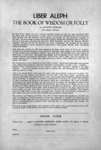100th
MP

|
THE
100th
MONKEY
PRESS |
|
|
|
Limited Editions by Aleister Crowley & Victor B. Neuburg |
|
Bibliographies |
|
Download Texts
»
Aleister
Crowley
WANTED !!NEW!!
|
|
BOOK OF WISDOM OR FOLLY (Prospectus) |
|
Image Thumbnails |
||||
|
Title: |
The Book of Wisdom or Folly. Prospectus |
|
||
|
Variations: |
|
|||
|
Publisher: |
|
|||
|
Printer: |
|
|||
|
Published At: |
|
|||
|
Date: |
Circa 1961. |
|||
|
Edition: |
|
|||
|
Pages: |
1. |
|||
|
Price: |
|
|||
|
Remarks: |
|
|||
|
Pagination: |
||||
|
Contents: |
|
|||
|
Author’s Working Versions: |
||||
|
Other Known Editions: |
||||
|
Bibliographic Sources: |
|
|||
|
Comments by Aleister Crowley: |
So much for the profane. For the aspirant I wrote the book called De Lege Libellum, otherwise called The Sandal, in which I analysed the Law as the source of light, life, love and liberty, and pronounced a panegyric upon it in each of these respects successively. For sustained sublimity of prose this book perhaps ranks next to those in which my pen was definitely and authentically inspired. (The criterion of such inspiration, by the way, is that in the case of an inspired book such as Liber VII or Liber LXV I do not dare to “change as much as the style of a letter”. I show, in fact, precisely that reverence for the author which should always be observed by the mere editor, and in this case, having not only the manuscript but my memory to assist me in case of any question arising as to the text in consequence of what my earliest tutor would doubtless have considered imperfections of caligraphy, there is fortunately no reason for anxiety as to the critical perfection of the text.) The above remarks may appear strange as a preliminary to the statement that I regarded and still regard this book The Sandal as essentially an exercise in technique undertaken in order to fit myself to write Liber Aleph, The Book of Wisdom or Folly, which is beyond question a consummate masterpiece in its particular sphere in literature. It has always been my custom to practise with a rapier very thoroughly before fighting a duel. If occasionally these friendly bouts have resulted in a few deaths — the more the merrier! Liber Aleph, The Book of Wisdom or Folly was intended to express the heart of my doctrine in the most deep and delicate dimensions. (Before using the word dimensions many considerations occurred to me. It is startling; that quality itself is not repugnant to its use in such a connection. Its use was followed by a discussion between myself and my cynocephalus, who was herself struck by the singularity of the word, so much so, that I had to warn her not to spell it with two d’s, and my explanations, thought unsatisfactory, decided me to insert this note in the text of my autohagiography.) Liber Aleph is the most tense and intense book that I have ever composed. The thought is so concentrated and, if I may use the word, nervous, that both to write then, and to read now, involved an involves an almost intolerable strain. I remember how I used to sit at my desk night after night — it was the bitterest winter that had been known in New York for many years — but even if the central heating had been the flames of hell itself, I doubt whether I should have been warm. Night after night I sat, all through, rigid as a corpse, and icier; the whole of my life concentrated in two spots; the small section of my brain which was occupied in the work, and my right wrist and fingers. I remember with absolute clearness that my consciousness appeared to start from a perfectly dead forearm. The book is written in prose, yet there is a formal circumscription more imminent than anything which would have been possible in poetry. I limited myself by making a point of dealing thoroughly with a given subject in a single page. It was an acute agony, similar to that of Asana, to write, and the effort removed me so far from normal human consciousness that there was something indicibly ghastly in its unnaturalness when I got into bed in full daylight in the hope of acquiring a particle of warmth from the complacent Camel. — The Confessions of Aleister Crowley. New York, NY. Hill and Wang, 1969. Pages 831-832. |
|||
|
Reviews: |
|
|||
